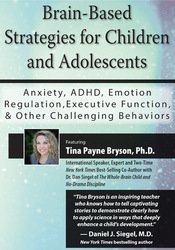

Watch Dr. Tina Payne Bryson, international speaker and co-author with Daniel J. Siegel, M.D. of The New York Times bestsellers The Whole-Brain Child and No-Drama Discipline, as she revolutionizes the way you treat behavioral, emotional and somatic challenges using brain-based strategies for children and adolescents.
This workshop will use an interpersonal neurobiology lens to focus on bilateral and vertical brain integration that will challenge your current ways of understanding and treating behavioral and emotional struggles. Using stories, case studies, videos and humor, Tina will provide creative strategies on how to integrate brain science into your practice and personal life. Dive into the neurobiological aspects of attachment and narrative. Learn the latest on neuroplasticity, plus experience the changing brain in a way that’s clear, interesting and practical.
You will walk away with a new framework for treating children, adolescents and families along with effective strategies to improve attention, emotional regulation and resilient flexibility!
| File type | File name | Number of pages | |
|---|---|---|---|
| Manual (2.68 MB) | 39 Pages | Available after Purchase |

Dr. Tina Payne Bryson (she/her) is the co-author (with Dan Siegel) of two New York Times bestsellers - The Whole-Brain Child selling over a million copies. Dr. Bryson is also the author of The Bottom Line for Baby (Random House 2020) and co-author (with Dan Siegel) of The Power of Showing Up (Random House 2020) and The Yes Brain (Random House 2018). Her upcoming book, The Way of Play (Random House 2025), co-authored with Georgie Wisen-Vincent, will be released January 2025.
Tina is an LCSW, and the founder/executive director of The Center for Connection (“CFC”), a multidisciplinary clinical practice with an interpersonal neurobiology lens; of the Play Strong Institute, a center devoted to the study, research, and practice of play therapy through a neurodevelopment lens; and The Center for Connection and Neurodiversity, a wing of the CFC devoted to celebrating neurodifferences and providing brain-based occupational therapy, and interdisciplinary clinical work across the lifespan.
Tina keynotes conferences and conducts workshops for kids, parents, educators, clinicians, and industry leaders all over the world, and she makes frequent media appearances (for example, in TIME Magazine, Good Morning America, Huffington Post, Redbook, The New York Times, The Wall Street Journal, and Real Simple). When she isn’t teaching, she consults with various companies and organizations, including the Nike Sport Research Lab (NSRL) where she was project director for mental or emotional performance, offering direct support to athletes and supporting research. She also works as a child development specialist at St. Mark’s School in Pasadena, CA. A graduate of Baylor University, Tina earned her LCSW and PhD from the University of Southern California, where her research explored attachment science, childrearing theory, and the emerging field of interpersonal neurobiology.
Tina emphasizes that before she’s a parenting educator, or a researcher, she’s a mom. She limits her clinical practice and speaking engagements so that she can spend time with her family. Alongside her husband of 30 years, parenting her three boys is what makes her happiest.
Tina’s professional life now focuses on taking research and theory from various fields of science, and offering it in a way that is clear, realistic, humorous, and immediately helpful. As she puts it, “For parents, clinicians, and teachers, learning about how kids’ (and their own) brains work is surprisingly practical, informing how they approach discipline, how they help kids deal with everyday struggles, and ultimately how they connect with the children they care about.”
Speaker Disclosures:
Financial: Tina Payne Bryson is the Founder and Executive Director of The Center for Connection and The Play Strong Institute and has an employment relationship with Saint Mark's Episcopal School. She receives royalties as a published author. Tina Payne Bryson receives a speaking honorarium, book and recording royalties from PESI, Inc. She has no relevant financial relationships with ineligible organizations.
Non-financial: Tina Payne Bryson serves on the advisory board for Austin Interpersonal Neurobiology and Fuel Ed. She is a member of the National Association of Social Workers, is a distinguished member of the San Gabriel Valley Psychology Association, and a member of Sensorimotor Psychotherapy Institute.
Please wait ...